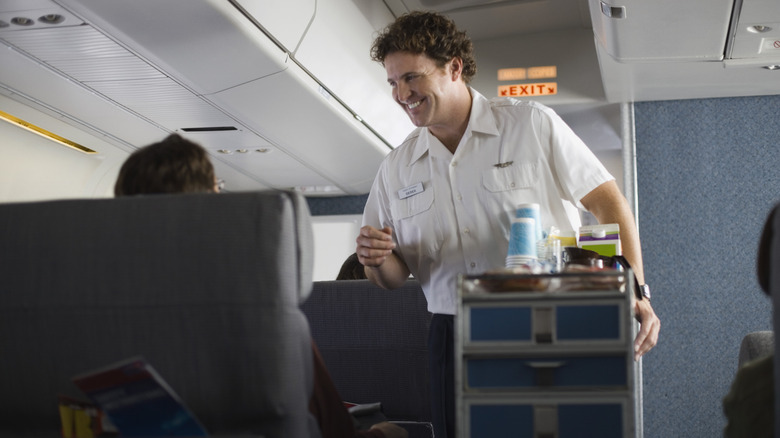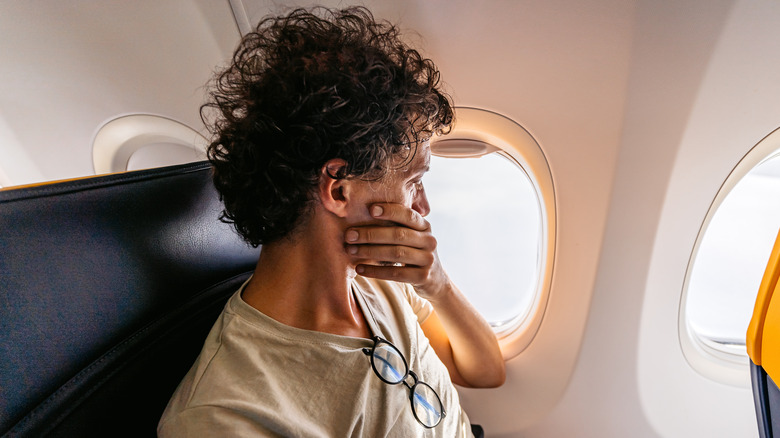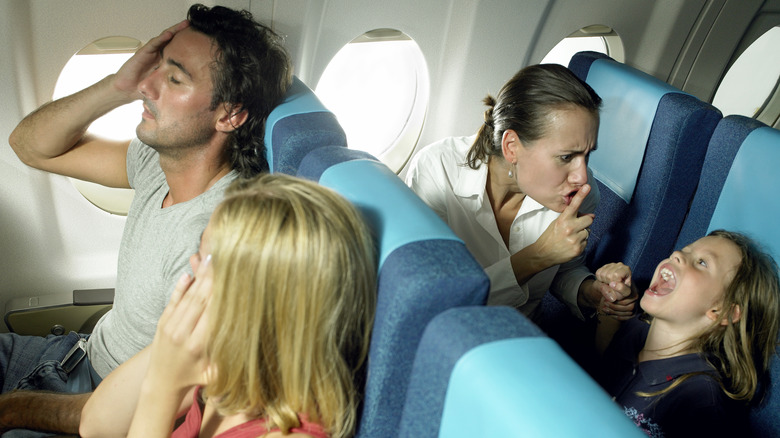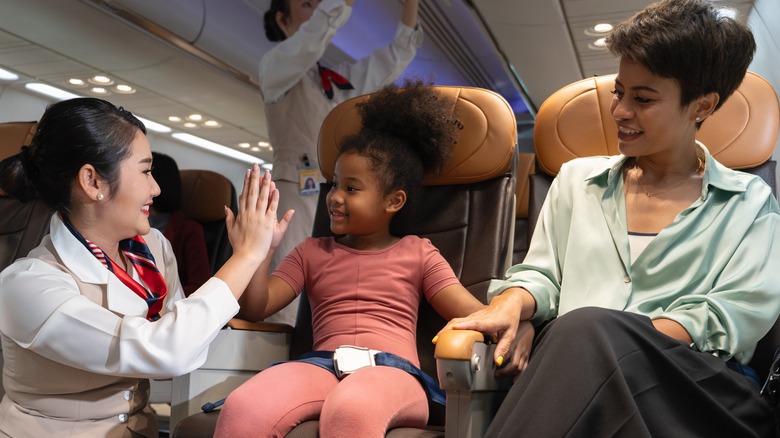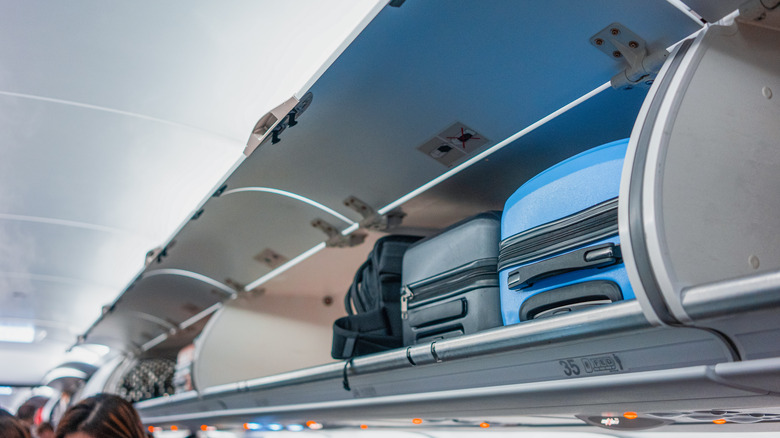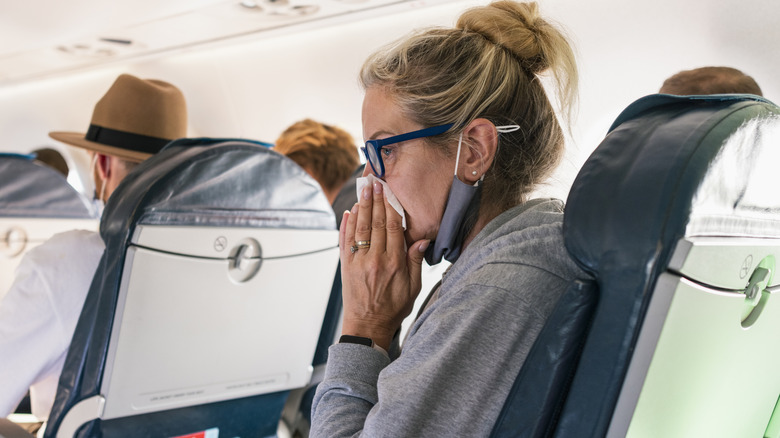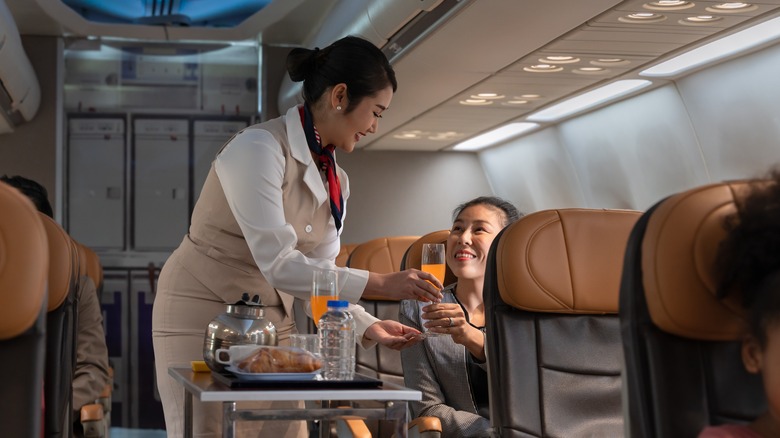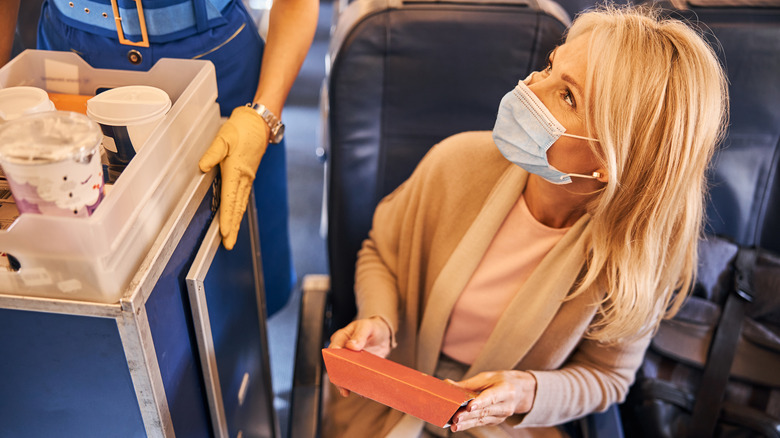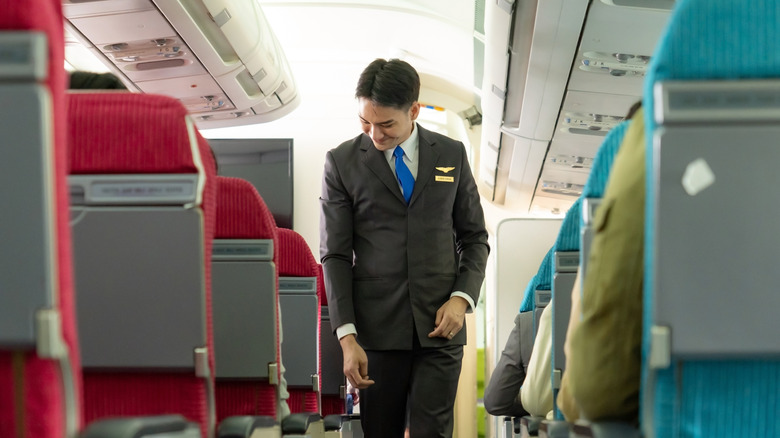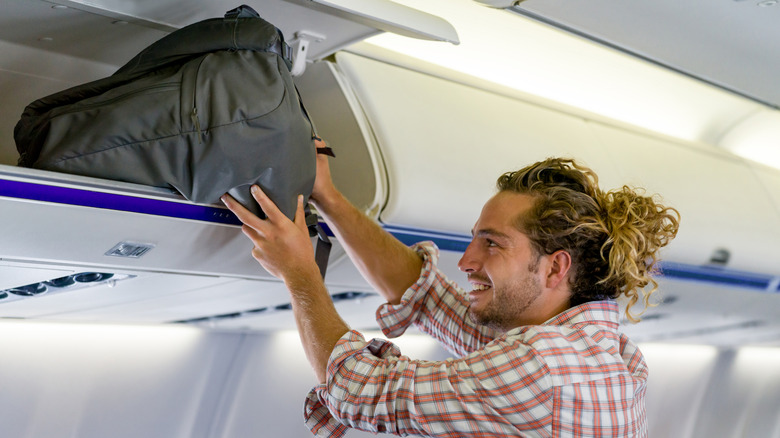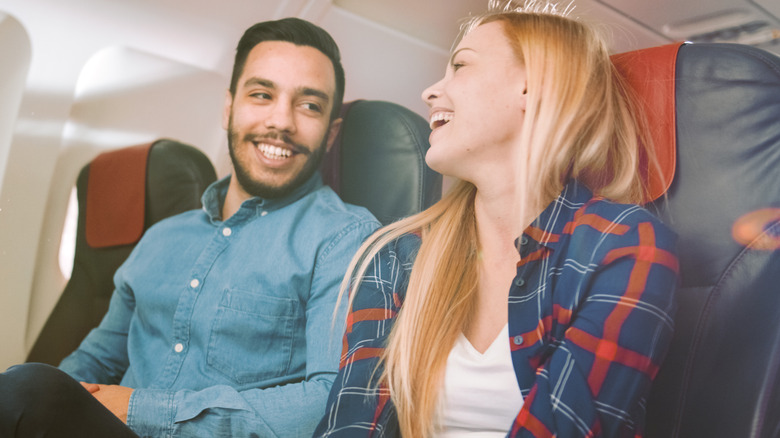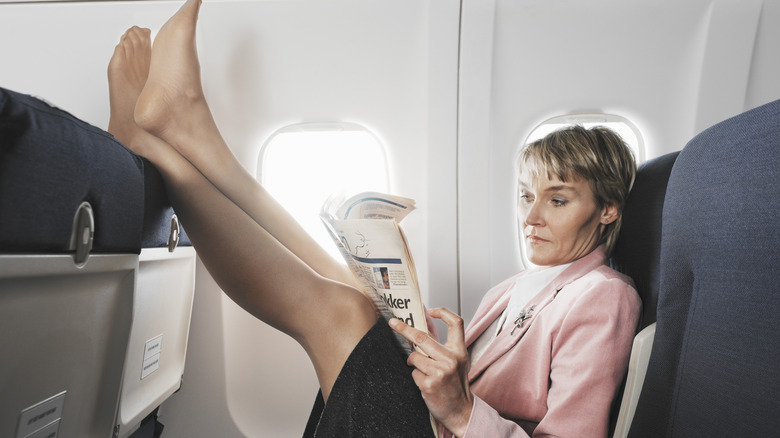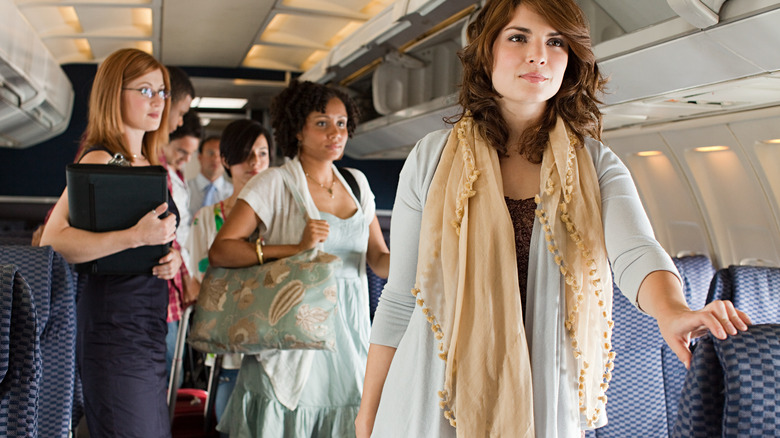Flight Attendants Always Notice These Things About You When You're On A Plane
Between packing and making sure you aren't late, you probably don't spend much time thinking about a flight attendant's impression of you. So, it may come as a surprise to find out that flight attendants notice many details — both big and small. Just as you may make assumptions about a person when you first encounter them, the flight crew tends to notice common mistakes that passengers make, and may act accordingly. Think about it from their perspective. They encounter nearly every personality type imaginable, from chipper families to exhausted business travelers. Add to that a crying child, a nervous flyer, and people who are just impossible to please, and it's easy to understand why flight attendants glean so much based on that first impression.
Whether it's your body language, the way you handle your bag, or how you greet them, these factors can influence the crew's thoughts about you. If you want to be better prepared for your next trip, be mindful of these habits to make sure your flight attendants (and you) have happier flights. Here's what they want you to know about the things that they inevitably notice.
Flight attendants notice if passengers seem nervous
Known as aerophobia, fear of flying afflicts some 25 million adults in the United States and can cause symptoms similar to a panic attack, including racing heart and sweating (via Cleveland Clinic). Some people manage fears using calming techniques, but others may avoid flying altogether. "What is occurring in the brain is a normal and protective release of chemicals triggered by a frightening event," Alyson Smith, M.D., managing director of emotional health and well-being programs at Delta Air Lines, told Texas Health.
Flight attendants recognize that fear. Veteran flight attendant, Barbi, who has 40 years of experience with a major airline, exclusively tells Islands, "I notice passengers who seem lonely or scared and don't know how to reach out for comfort or assurance." Kim Howard, a flight attendant for Avelo Airlines, has some advice. "Let your flight attendant know if you get anxious, so we can support you throughout your journey," she told HuffPost. "... I ask their seat number and will reassure them before takeoff and check on them throughout the flight." That kind of comfort is priceless to passengers who would rather be anywhere else. Delta Air Lines flight attendant Laura Nottingham recommends finding a distraction. "Take advantage of the time you have during flight to read a book, listen to music, or make that to-do list."
Flight attendants can tell when passengers need a little extra help
Many situations can affect the flight's quality, and traveling with kids may be a disruptive experience if they're nervous or can't calm down. Elderly individuals, people with disabilities, and non-native speakers might require a helping hand, and luckily flight attendants are usually the first to notice this. "I'm noticing the passenger that's a single mom with their kid that might just need a little bit more help or a just a little bit more patience," a Delta Air Lines flight attendant told Business Insider. To help calm down kids, Orlando flight attendant Aimee LaMay explains to Condé Nast Traveler, "We have to be a skilled negotiator in these situations."
Flight attendants can make accommodations for passengers who need more help. They can assist with boarding and disembarking the flight, or arrange for someone to help. They can provide more specific attention to non-native speakers who have questions, or find a crew member who speaks the passenger's language, which may bring enormous comfort to them. They can also patiently help elderly or disabled passengers and check on them periodically.
Flight attendants take note of polite passengers
The golden rule applies everywhere in the world, but it's especially welcome 35,000 feet off the ground. A quick glance at the headlines is proof enough that things can definitely get rowdy up in the sky. If anything, flight attendants are more on the alert than ever for passengers who have the potential to create unwelcome viral moments that capture headlines. Barbi confesses to Islands that she always notices, "If they're polite or rude to the crew and the passengers around them."
Of course, not all cranky passengers are necessarily impolite. "Unusual behavior may also indicate a passenger who is highly agitated because they may not be used to flying," flight attendant Jill told the Association of Flight Attendants-CWA. "A panic attack at 12,000 feet can be a difficult situation." They may opt not to say anything if that's the case, instead keeping a discreet eye on the person.
They're also mindful of those who are too polite. What could possibly be wrong with practicing proper etiquette in the friendly skies? It depends on the situation. Flight attendant Ethan S. tells Reader's Digest that sometimes passengers beckon him over for a chat to keep him occupied. But, he says, "We're actually quite busy the whole flight. There are a lot of things we need to get done that you may not be aware of."
Flight attendants assess your carry-on bag
Airlines imposes strict restrictions on bag sizes, so it makes sense that there may be occasions when luggage catches the flight attendant's eye. Experienced professionals might notice if a passenger struggles to handle their bag, for example, or if the bag appears tampered with or modified in any way. They might even take note of a smaller detail, like a passenger that takes a bit too long to hoist and position the bag in the overhead compartment.
While these aren't always signs of a problem, unusual details can definitely indicate cause for concern. That was the case on a Ryanair flight in the summer of 2024. "There is suspicious luggage, and a bomb-disposal search will follow, which was preceded by the evacuation of the aircraft and the wider surroundings," the police said in a statement, according to Expats.cz. The "suspicious" activity in question was a ticking noise detected from a bag. A careful search yielded nothing of concern, but this type of safety measure is vital to protecting every single person on the flight.
"I try to pay as much attention to bags as possible," Delta Airlines flight attendant Reginald D. Dominique told Reader's Digest. "Does anything look a little off? Is the luggage too large to fit in an overhead compartment? I also check whether bags have been tagged to be put in cargo or have hazard labels on them."
Flight attendants can often detect when a passenger is unwell
Flying while sick isn't recommended. The CDC provides guidance for cabin crew to identify unwell passengers by symptoms. They're trained to identify a contagious situation if someone coughs incessantly, vomits, can't breathe properly, or is obviously not well. To protect others, they might offer masks and gloves to minimize the spread of germs and bacteria.
An anonymous flight attendant told Reader's Digest it's best to handle these situations before the plane takes off. "Several times, I have had passengers who say they will be fine and then, five minutes later, are vomiting at their seat. At that point, we have to remove the passenger from the plane. Their condition is only going to get worse, and rather than have to deal with it during the flight, it's better to address the issue while on the ground with medical personnel available." Flight attendants are trained in both first aid and CPR, so they can help in some situations. But, there may occasionally be instances when they need to ask for a doctor on board to help.
Flight attendants can tell if you've had one too many drinks
A flight attendant may notice if you'd had more than a few drinks. Getting drunk pre-flight is not advisable, as cabin crew can often detect that by your behavior or by smelling the alcohol on your breath. You risk all kinds of questionable behaviors in this state, from the sheer public humiliation of doing something you might not remember later (or that gets you into trouble) to being so aggressive that you're escorted off the flight.
Explains an anonymous flight attendant to Reader's Digest, "The last thing you want is someone drunk and erratic on a flight, so it's best to remove them prior to takeoff." In fact, cabin crew have the fine art of detecting drunk passengers down to a science. Josephine Remo Finderup, a travel blogger and former Scandinavian Airlines flight attendant, tells Newsweek, "Yes, flight attendants are trained to identify signs that passengers are unfit to fly. Signs include unsteady walking, slurred speech and not wanting to make eye contact."
Drinking in-flight may also pose a health risk, according to a 2024 study published in BMJ Journals, "Even in young and healthy individuals, the combination of alcohol intake with sleeping under hypobaric conditions poses a considerable strain on the cardiac system." And in the unlikely event that there's an emergency, being inebriated could slow your reaction time and even affect the safety of others around you.
Flight attendants note if you're smart about handling trash
How you handle trash might interest your flight attendant. Are you the type who stuffs a napkin in the seat's back pocket or carelessly tosses a cup on the floor? Trust that your flight attendant has caught on to your trash-handling techniques.
Barbi tells Islands that she notices it all, explaining, "Those who watch how I am picking up trash, whether I am separating cans from the trays or boxes. And, if they take the time to make it easier for me by separating their trash before I get to their row." Trash collection time is also not the time for special requests. A flight attendant on Reddit highlighted just how much of a challenge it can be, saying, "How am I going to remember that 6B wants a coke, 10A wants coffee with 3 creams, 12F wants a vodka soda, 13F needs headphones, and 20D wants a beer by the time I've finished doing trash for 30 rows?"
Being considerate of their specific tasks can make a flight attendant's day too, too. An anonymous professional tells CBC, "I don't like to say no to people, so I'll always take your garbage with a smile. People love to hand me large piles of garbage while I'm serving food, or refilling drinks. There are dedicated 'garbage walks' that are specifically meant for disposing of your trash. You can tell it's time because I'll be holding a garbage bag and wearing plastic gloves."
Flight attendants notice passengers who pay attention to things
Little things matter, according to Barbi. She exclusively tells Islands, "People who pay attention to their surroundings and are aware of what's going on, even if it's just routine stuff. Like listening to the food choices I'm offering and being prepared when I get to their row." She adds that even odd situations catch her eye. "If your luggage is hanging out past the edge of the bin, it is unlikely the bin will shut. I notice which passengers pay attention to these little things and which don't."
These considerations make you a more aware passenger. Luckily, being vigilant is not difficult. Charlotte, a former cabin crew member, tells Condé Nast Traveller, "We used to refer to the cabin as the jungle. There were so many people with different perspectives, demands and expectations, all crammed into a flying tin. There are so many variables and things that could happen that are totally out of your control, so every day we wondered whether we'd have a passenger do something that most people on the ground would think is absurd." Being mindful of seemingly minor gestures, like making note of what's available on the menu that day, fastening your seatbelt when instructed, and powering off your devices, can help make your flight attendant's experience more pleasant, too.
Flight attendants might note people who seem especially strong
Why might a flight attendant notice a passenger who looks like they lift weights? It turns out that being in good shape could come in useful in case a crew member requires some extra resources in-flight. For example, they may need a hand lifting a heavy bag that they can't safely handle themselves, or they might need someone to assist them in de-escalating a potentially tense situation before it becomes too serious.
"If I see someone who is muscular, powerful, strong, physically fit, I memorize his/her face and make a mental note of where they are sitting," Janice Bridger, a seasoned flight attendant, tells Travel + Leisure. "I consider this person a resource for me. In the event of an attack on the flight or on me, these are my 'go-to' people. If a situation looks like it could develop, I'll privately and discreetly ask one of these people if they would be willing to help us if necessary. Help might involve subduing or restraining an unruly passenger. We hope it never happens, but we will prepare just in case it does." Flight attendant Rania of Rizz Air agreed, explaining on TikTok (via Local12) that she greets passengers "[t]o see who could help us in an emergency."
Flight attendants definitely notice your body language
How you behave when you board can say a lot about your potential in-flight demeanor. That's why flight attendants keep an eye out for anyone who seems suspicious. It's key to everyone's safety, as being vigilant can make all the difference. Some details they watch for are fidgeting, an obviously-nervous appearance, or anything that seems untoward or out of the ordinary.
But slumped shoulders or a frowning face aren't always a sign that you're a difficult passenger. A flight attendant for United Airlines says to Ladders, "If people are having a bad day, I definitely notice that. You can tell by the person's body language or facial expressions or if they've been crying. I know that air travel is really hard for people."
Of course, body language can also inform flight attendants about those passengers that need a little more attention. It may be someone who's nervous but not sure how to ask for help or even someone who's never flown before. In any situation, these trained professionals are there to make the experience go as smoothly as possible.
Flight attendants are well aware if you take off your socks
It's one thing to take off your shoes on the plane, but quite another to go barefoot. This is a notorious airline faux pas that may even land you your very own viral moment if you dare to bare those feet on another passenger's armrest. Not only is it displeasing to passengers, but flight attendants warn that it's also plain unsanitary.
Flight attendant Lauren Guilfoyle tells Reader's Digest, "Sometimes glasses are dropped and broken, or our youngest travelers leave crumbs, so there could be sharp objects and food on the floor." Another divulges to the New York Post, "I would never fly barefoot on a plane. Passengers these days can be quite messy and we see everything from spills to dirty diapers thrown on the floor."
There's also the matter of your safety in the event of an emergency. Being barefoot could hinder your movements if you need to evacuate quickly. It's also important to keep your footwear on during two key points of the flight, according to an anonymous flight attendant who works with Qatar Airways. "You should keep your shoes on during takeoff and landing, because that's the most dangerous part of the flight," they told The Points Guy. And never, ever step into the lavatory barefoot. "I promise you, nine times out of 10, that is not water on the floor," a stewardess posted on Reddit.
Flight attendants also take notice of your entire outfit
Both comfort and safety should be top considerations when determining your in-flight outfit. Vanessa Settimi of Swoop Airlines confesses to Reader's Digest, "Now this might just be the flight attendant in me, but you will never catch me flying as a traveler in sandals and a tank top!"
Anything that might be complicated or that would be difficult to remove when using the restroom should be off-limits, according to flight attendants. Breathable fabrics are ideal, as they won't restrict movement or cause you discomfort. A layering piece, like a cardigan, a flannel shirt, or a light jacket, is also a good idea — it gets cold up there. If you're traveling for business, American Airlines flight attendant Andrea Fischbach tells Who What Wear to consider a sheath dress. "Don't forget blazers to dress it up if you're on your way to a post-flight meeting and maybe a change of heels if flats or loafers don't work for your total ensemble. And ask your flight attendant if it is okay to hang it in the closet. Who wants added wrinkles? Look your best!"
The flight attendants also check to see if you're wearing flight-friendly shoes. Sneakers or comfort sandals with closed toes are ideal. The outsole should provide plenty of traction for your trek through the airport. Avoid wearing shoes like high heels, flip flops, or anything that could slow you down or doesn't provide significant protection for your feet.
